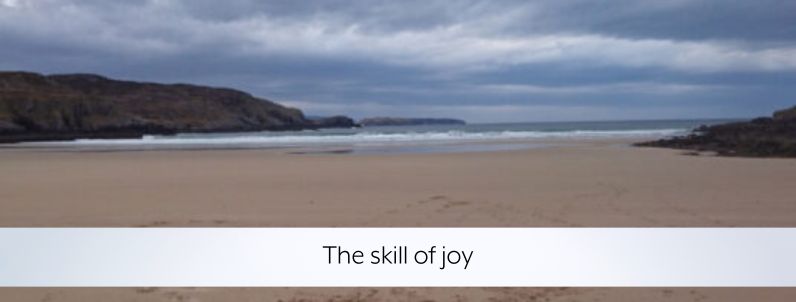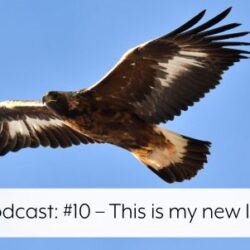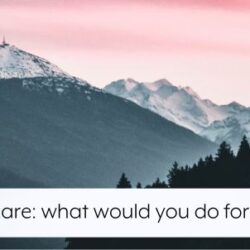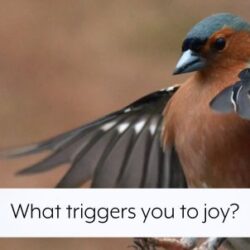
I’m on a white beach on the north coast of Scotland. It’s my favourite beach in the world. A wide, wild spread of sand jagging around in a dog-leg, sweeping across to a jutting piece of headland housing a military outpost. It’s a two mile walk from one end to the other. Just white, unsullied sand. And waves. Oh, the waves! Breakers and surf and a roiling conflagration of joy. The swell racing towards the shallow shore, waves tumbling over each other in an eager welcome, desperate to see me. Here they come, crash and mess and froth, surging with power – so much power! – and the water is clear like a crystal. The perfect table-spread of sand on the beach: no footmarks, no dog tracks, no litter, no crud. Just perfect. Pristine.
In the backdrop, mountains. And right now, wrapped around them like blankets, are rain clouds. “Come on then,” I want to shout at them. “Let’s be having you!” Because the rain here is glorious. The wind swoops in at 40 miles per hour or more, just this wall of spray and icy freshness, and it’s exhilarating. I want to reach out and grab it and bag up the ozone. I breathe it in, deep down into my lungs, into my guts, to my feet. I can’t get enough of it. It’s so fresh.
It’s the most magnificent view. No photo will do it justice. And then there’s my dog. Oh what a dog! There she goes, a white bottom bobbing like a rabbit as she skims across the sand. She’s so glad to be alive. She can’t run in a straight line and her pawprints in the sand career left and right with the sheer joy of running into the wind and the surf. It’s the sheer joy of being alive. It’s the sheer joy of wind and sky and sand and surf. And for me it’s the sheer joy of watching her. Nothing gives me pleasure like her exuberant sprint across the white. She stops, fur stripped back in the gale, sniffing into the wind. Reassured that this is our beach and no-one else has invaded it, she leaps off again just for the thrill of running.
It’s this most incredible day – the sun jumping in and out of the clouds, showers erupting into sudden deluges, the wind screaming across the sand, waves smashing each other at right angles, the swell dancing with a stupid, reckless exuberance. And mountains ringing the horizon, dark and ominous and playful and eager. Patches of blue sky sliding right up against the black swarm of clouds. I am filled, for a moment at least, with the clean, bright pleasure of being alive.
These are the things I enjoy.
Enjoy.
I catch myself even as I think it. I am surprised. Here I am now and the thrill of aliveness, on this beach, has come naturally to me. I didn’t force it. I’m not pretending. From habit, I wait for it to leak out of me, for this moment of joy to be crushed by the inrush of dread, of doubt, of despair. But it doesn’t happen. The joy shimmers on the surface of my mind. It just is. A moment of enjoyment, unspoilt by trauma.
It’s taken me over forty years to get here: it’s taken me all of my life. But it’s here. I’m here. The joy is here, and no-one is taking it away.
Too often in the past joy would turn to pain. Abuse robs you of the ability to be in the moment, to be alive. Fear trumps joy. We can’t enjoy anything we’re doing because we don’t believe we deserve it. It must be a trick. It’s the prelude to grooming. It will all turn to pain.
How did it all change?
Ten years ago I would have stood on this beach and struggled to breathe. My body would have been cocooned in pain. I wouldn’t have seen the colours in the sky. I wouldn’t have felt the wind on my face. I would have been locked in a tunnel, dreading everything, hollow within myself, aching, despairing, confused. Fear and pain and dread – not joy. I didn’t know what joy was.
Like a slow leak, drip-drip-drip, things changed. Trauma leaves you with a brain dedicated to danger. Fear isn’t a choice – it’s an inbuilt survival mechanism. And I used to berate myself for it. What is wrong with you?! Get a grip! Just let it go! But my survival-based back brain wasn’t listening. It’s not safe here, it would whisper back at me. We’re going to get hurt. When I heard it, I got annoyed: We’re perfectly safe. There’s nothing the matter. Stop overreacting!
But the back brain doesn’t deal principally in words. It deals in guts and instincts and evolution. It deals in the body. I had to learn to calm my body down before my mind would follow. All the CBT in the world wouldn’t reach into my bowels and turn off the alarm, because it was sounding at a level below consciousness. It was sounding with the echo of trauma. Better safe than sorry is its motto, and it served me well during childhood. But into adulthood, in safety, it imprisoned me.
Drip-drip-drip. I expected the effects of trauma to vanish suddenly, with a stroke of magic, the holy grail. Find the one thing – the one thing! – that wiped it all away. Open my eyes and see life different. Look around and realise that I am transformed. I was looking for miracles.
But it came drip-drip-drip. It took patience. Patience to learn how to enjoy myself, how to settle into joy in the everyday visions of waves and clouds and leaves. I had to learn how to notice.
‘What is happening in your body, right here, right now?’ the therapist would ask. What is she going on about? I used to wonder, silently. How could her question possibly help? How could driving my attention inwards, into the space behind my ribs, into the nothingness of my feet, help resolve trauma?
But here I stand now, and I can feel the wind on my face. I can feel it. This, for me, is a momentous achievement. Because I used to sit in therapy, being asked where I feel this feeling in my body, and all I felt was a blank. I didn’t even really know where my body was. It moved to my command, but I didn’t know where it was. I didn’t know how it felt. I lived in my head, not in my body.
Sometimes I would attempt a guess at my feelings: ‘I feel sad?’ Always a question, a wild stab in the dark, rather than a knowing. ‘Where do you feel sad? Where in your body?’
Sometimes that question alone would make me want to cry – in despair at my stupidity, that I didn’t even know.
Directing attention towards my body felt like the most dangerous thing. As a reflex, I turned away. I don’t want to see; I don’t want to know. In childhood, in the abuse, this was adaptive: turn away, turn away. Turn away from the pain. Turn away from the shame. Turn away from the powerless, frozen captivity of not being able to move a muscle. And so I was conditioned to ignore my body, to push it out of consciousness. It shielded me from the pain, from the deep, dark sick feeling of what was happening to me.
But it also obscured the joy – at other times, the joy of being alive. The joy of the wind on your face, the tumult of waves breaking like cymbals in your ears, the salt-spray smell on the air, the crunch of seashells and sand under your feet.
I had a decision to make.
Take the good with the bad, the joyful with the painful, the pleasure with the pain? Or live numb forever, everything blocked out, everything grey and odourless and unfeeling?
Gradually, bit by bit, I learned to tolerate my body, the sensations, the feelings, the in-the-moment experiences. It took a long time. I had to believe that it would be worth it.
It was.
The rain pelts hard on my face, icy like daggers, but I’m wrapped up tight in my waterproofs and I let it fall. It is fresh and clean and full of goodness. A hundred yards out to sea up bobs the head of a seal, like an inflatable ball, black and shiny and inquisitive. I notice the leap in my chest, the sudden flame of pleasure. Up in the hills earlier, as I rounded the crown of the loch, I saw eagles patrolling the sky. Vast wingspans and feathers splayed out to the very edges, majestic and graceful and glorious and terrifying. My heart had leapt then too.
Six years ago, I saw my first golden eagle up here, a lifetime ambition. It was an adult with a juvenile and around they swept in the sky like they were riding an invisible fairground ride, and I stood and watched and the joy filled me up from my boots to my hat, all glimmering and warm. I can’t believe it, I had said a hundred times for the rest of the day as joy spread smiles across my face. I can’t believe it.
I had to learn to believe it. I had to learn to believe that life is punctuated with these moments of joy, and that I can experience them too. Now as the seal bounces through the waves, I believe it. It’s okay for me to be here, I think. It’s okay for me to enjoy this. I gasp in the spiky air, almost breathless with the sudden surge of feeling. This is joy, I remind myself, and my smile deepens. Yes, this is joy. And it’s mine. And it’s okay. And it’s a skill that I have learned.



2 Comments
Oh Carolyn, you write so well. I have read the first part over and over……and I am totally on that beach, feeling the wind and the rain, hearing those waves, and breathing…………
Takes me away from where I am, allows me hope and possibility.
And one day I found myself laughing ( not at you but at myself) at the recognition of those times when the therapist asks you what you are feeling and where it is in your body, and normally I am flooded with shame and self hatred for not knowing/ not being able to answer such a seemingly simple question!! I love that you admit to guessing sadness but not having a clue…..me too!….and suddenly I laugh and don’t feel ashamed anymore…….ofcourse I don’t know!!
So I am hoping that next time I will feel differently…….can be more honest…….say pass, next question please!!
Thank you for the hope Carolyn! I think I am where you were 10 years ago and hope is what I need: hope that it will change that I will be able to feel again.
Currently I am stuck, stuck in not feeling, not knowing how to express and just like you I guess. I guess using my intellect as to whether I’m feeling violated, sad, abused, alone, but I don’t really ‘know’ because it’s an intellectual response rather than a real one. I don’t know how I feel…..
But you give me hope that it will change, that this process, this journey will take me to a place of knowing and understanding myself better and maybe trying not to let my past define my present. I will continue with my journey with a bit more hope, but also with a bit more compassion towards myself when I’m stuck.